
A team of researchers believe they may have a way of testing the hypothesis that consciousness in humans arises from entanglement within our brains. To do so would involve creating interfaces between human brains and quantum computers, and attempting to measure any resulting changes in consciousness.
Consciousness is something we all have, but know surprisingly little about. We know how to turn it off with anesthetics, but we aren’t really sure how they work either. There are plenty of people working on the problem, but we still don’t know whether consciousness is the result of integration within a system (known as integrated information theory) or the result of information being shared across the brain (global workspace theory), the two leading ideas. With so little known, there is room for other, more out-there ideas.
In 1989, British mathematician and Nobel Prize in Physics winner Roger Penrose did just that, suggesting that quantum entanglement is involved in consciousness. Though we cannot summarize his full argument, spread out over several books, the gist of it boils down to the idea that there are some problems that cannot be completed or comprehended by traditional computers. Humans can deal with these problems and comprehend them, such as non-computable numbers and Gödel sentences, and so the human mind must not operate like a traditional computer. Instead, Penrose suggests that consciousness could arise from quantum entanglement within the brain.
The argument, which was not well met at the time, has actually seen a bit of a revival in recent years, though it remains on the fringes of consciousness research. One limit on the idea was that quantum entanglement is fragile and easily broken even at low temperatures, so how could we produce and maintain entanglement in the warm mushy environment of our brains?
But since then, it has been suggested that microtubules inside neurons could provide this stable environment for entanglement. Earlier this year, one team claimed that they had found supporting evidence of this idea, after giving rats microtubule-binding drugs and finding that it then took longer for anesthesia to knock them out, suggesting that they played a role in consciousness.
While further study in that area may give us further clues to what consciousness is and how it works, another team has a far wackier idea for testing whether consciousness is a quantum process. This team, which includes Hartmut Neven, lead of Google’s Quantum AI lab, makes the assumption that Penrose is wrong in his suggestion that consciousness arises at the point of superposition collapse, instead suggesting it could arise when it formed, in order to sidestep the absurd possibility of faster-than-light communication in the brain.
The team suggests that the way to test this theory of consciousness is to try to “expand” our own consciousness using an interface between our brains and a quantum computer.
“In an experimentum crucis, one would establish a physical link between a human brain and a quantum computer that would enable coherent interactions and mediate entanglement. If our conjecture is accurate, this should enable richer conscious experiences of the combined system, requiring more descriptive bits than the experiences the human reports without the link,” the team explains in their paper, adding that it requires coupling a system within the brain with qubits in superposition inside a quantum computer.
“Before the systems are coupled, their respective states exist in separate state spaces, known as Hilbert spaces, of dimension N and M, respectively. After they are made to interact, the wave function describing the combined system |𝜓𝐶𝑦𝑏𝑜𝑟𝑔〉 resides in an 𝑁×𝑀 -dimensional Hilbert space,” the team writes. “We conjecture that a superposition forming in this higher dimensional state space would be experienced by the subject as a richer experience as compared to a superposition state forming in the lower N-dimensional Hilbert space describing the isolated brain of the subject.”
Talking to New Scientist, Neven elaborated on how that would work.
“Let’s say we have ‘N’ qubits in our brain and ‘M’ qubits in an external quantum computer, with the letters referring to a certain number of qubits. If a person could entangle their brain with this quantum computer, they could create an expanded quantum superposition involving ‘N+M’ qubits,” Neven said. “If we now tickle this expanded superposition to make it collapse, then this should be reported by the person participating in this experiment as a richer experience. That’s because in their normal conscious experience, they typically need ‘N’ bits to describe the experience, but now they need ‘N+M’ bits to describe it.”
“I call this the ‘expansion protocol’, as it would allow us to expand consciousness in space, time and complexity.”
According to Neven, reports of richer experiences in these circumstances would offer evidence that consciousness is a quantum phenomenon. While a neat idea, there the test would rely on being able to couple activity in somebody’s brain to a quantum computer, which would be an invasive procedure and is not going to happen any time soon.
As well as this, there are many other ideas on consciousness with promise too, many of which don’t rely on such invasive procedures. As the team notes, research into inert gases such as xenon and their effect on consciousness may be more fruitful in the meantime.
The study is published in Entropy.
Source Link: Scientists Want To Entangle Human Brains With Quantum Computers To Learn About Consciousness